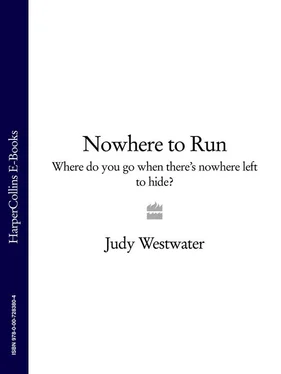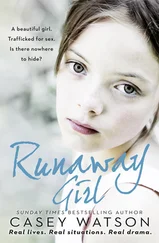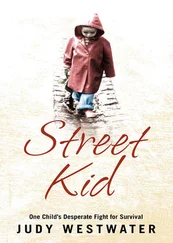Where do you go when there’snowhere left to hide?
THE BESTSELLING AUTHOR OF STREET KID

FOR ALL SURVIVORS
Hold fast that strength of courage
Title Page Nowhereto Run Where do you go when there’snowhere left to hide?
Dedication FOR ALL SURVIVORS Hold fast that strength of courage
Prologue Prologue I never had anyone looking after me—I always just looked after myself from when I was very young. My father, a phoney spiritualist preacher, used me as a punch bag from the day he abducted me as a two-year-old from his estranged wife’s home in a spiteful gesture of revenge. His partner Freda treated me like her slave, starving and beating me daily and locking me out in the back yard in all weathers. Things weren’t any better when they took me to live in South Africa then abandoned me, so that I ended up sleeping rough on the streets of Johannesburg at the age of twelve. When I was seventeen, I came back to the UK to look for my Mum but found she didn’t want to have anything to do with me; she and my sisters had their own lives to lead by then. I was pretty streetwise and knew how to keep myself alive. I wouldn’t starve or die of cold so long as I could forage in dustbins for food and find an old shack to sleep in. But I didn’t have a clue about how normal human relationships worked. I didn’t have any social skills or instincts about character. If someone was nice to me, I thought that meant they were a good person and I gave them my trust. If they treated me badly, I thought it was my fault, that I must have done something wrong. As for love, I didn’t know what that meant. A whole new learning curve was about to begin.
Chapter One
Chapter Two
Chapter Three
Chapter Four
Chapter Five
Chapter Six
Chapter Seven
Chapter Eight
Chapter Nine
Chapter Ten
Chapter Eleven
Chapter Twelve
Chapter Thirteen
Chapter Fourteen
Chapter Fifteen
Chapter Sixteen
Chapter Seventeen
Chapter Eighteen
Chapter Nineteen
Chapter Twenty
Chapter Twenty-one
Chapter Twenty-two
Chapter Twenty-three
Chapter Twenty-four
Chapter Twenty-five
Chapter Twenty-six
Chapter Twenty-seven
Chapter Twenty-eight
Chapter Twenty-nine
Chapter Thirty
Chapter Thirty-one
Chapter Thirty-two
Chapter Thirty-three
Chapter Thirty-four
Epilogue
Pegasus Childrens Trust
Acknowledgements
Other Books By
Copyright
About the Publisher
I never had anyone looking after me—I always just looked after myself from when I was very young.
My father, a phoney spiritualist preacher, used me as a punch bag from the day he abducted me as a two-year-old from his estranged wife’s home in a spiteful gesture of revenge. His partner Freda treated me like her slave, starving and beating me daily and locking me out in the back yard in all weathers. Things weren’t any better when they took me to live in South Africa then abandoned me, so that I ended up sleeping rough on the streets of Johannesburg at the age of twelve. When I was seventeen, I came back to the UK to look for my Mum but found she didn’t want to have anything to do with me; she and my sisters had their own lives to lead by then.
I was pretty streetwise and knew how to keep myself alive. I wouldn’t starve or die of cold so long as I could forage in dustbins for food and find an old shack to sleep in. But I didn’t have a clue about how normal human relationships worked. I didn’t have any social skills or instincts about character. If someone was nice to me, I thought that meant they were a good person and I gave them my trust. If they treated me badly, I thought it was my fault, that I must have done something wrong. As for love, I didn’t know what that meant.
A whole new learning curve was about to begin.
The advert in the Manchester Evening News read: ‘Trapeze artist wanted. Belle Vue Firework Island and Amusement Park.’ I’d worked in a circus before, in South Africa: once, when I was eleven, I ran away from my father and stepmother’s brutal regime and joined Wilkie’s Circus for two months until I was apprehended. I looked back on those days as some of the happiest of my life, when I felt part of an extended family of fairground folk. Now, in 1962, I was seventeen, homeless and needed a job badly, so I rang the number in the advert and arranged an interview.
Speedy Barham was a short, stocky guy with a cheeky grin. He’d been a pilot in the air force but now he owned an aerial circus act that he called the Australian Air Aces. He came forward to greet me in the tent when I arrived, holding out his hand.
‘So, you must be Judy.’
‘That’s me.’
I liked him immediately—he seemed really comfortable with himself, which set me at my ease. I also loved the smell of the place—the bales of hay and animal cages and the lingering sweetness of popcorn and candy floss.
‘It’s not like a regular job interview, you know,’ he grinned. ‘Is it OK if you hang around till Thursday?’
‘Sure,’ I said. I had nowhere else to be.
Speedy put me through my paces for a couple of days. I was skinny, but strong and very determined. I dived right in and hauled equipment, helped to set it up and spent hours swinging upside down on the trapeze as Speedy called out instructions. I made mistakes a couple of times and was terrified he would be cross with me. At home if I got something wrong my father had thought nothing of hurling me across the room, but Speedy just said ‘Whoa! I think you’d better try that one again.’
‘Don’t you feel nervous?’ he asked after one session. ‘That trapeze is pretty high.’
‘It’s OK,’ I said, but I couldn’t really explain to him why I had such steely nerves. The truth was that where I had grown up, getting badly hurt was a certainty. My father beat me almost daily on any pretext. I was used to being covered in bruises. Standing on a swing just didn’t hold the same threat, even if I was high up and without a safety harness. I shrugged. Sometimes being on the trapeze took my breath away, but it was no comparison to the kind of terror I had lived with when my father flew off the handle, hurled abuse in my direction and beat me black and blue.
When Speedy offered me the job I was so delighted that my face flushed with happiness. I could feel my cheeks glowing. It was like being accepted into a big happy family—like a dream come true for me. Speedy said I could stay on the fairground site in a 1930s brown coach with a yellow stripe painted all round it, so that solved my accommodation problem. We agreed a wage of eight pounds a week, which was a fortune for a seventeen-year-old in 1962. As Bobby, one of the other aerial artistes, put it ‘It’s not half as bad as working in Walls’ sausage factory.’
The act I was to perform in was an amazing type of aerial acrobatics. Speedy rode a motorbike round a track that was suspended forty feet up in the air. The bike was connected to a narrow platform that see-sawed up and down, causing the bike to somersault through the air with Speedy clinging onto it. Meanwhile, two other girls—Speedy’s girlfriend Vicky and Bobby, a glamorous blonde—and I would do a trapeze act above him. At the climax of the act, I had to leave the trapeze and walk slowly along the central platform until my weight caused Speedy’s wheels to descend once more onto the track. The show was to be performed outdoors so we’d have to watch out for gusts of wind, or rain making the platform slippery, and everything happened at high speed, without a safety net. There was no margin of error. One lapse of concentration could cost everyone their lives. So when I started we rehearsed the act over and over—it felt like a thousand times.
Читать дальше













